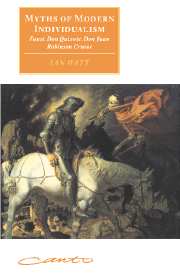Appendix - The worldwide diffusion of the myths
Published online by Cambridge University Press: 24 November 2009
Summary
There are bibliographies of all our myths; but unfortunately they vary so much, both in their degree of completeness and in their modes of classifying the works, that no accurate numerical comparison is possible. This note will, therefore, merely report some rough estimates from what is available.
As we would expect, it is Faust which has received the fullest treatment. There are two bibliographies. The first is Engel's Bibliotheca Faustiana, published in 1885. It lists 2,714 titles, of which quite a few might have been omitted, such as the ii listings of Don Juan, from Tirso on. But the major work is the fine four-volume Faust-Bibliographie by Hans Henning. The first volume deals with the period up to 1790, the second and third volumes deal with Goethe's Faust, and the last volume takes the story up to 1975.
Henning reports 22 editions of the 1587 Faustbuch in the 50 years following its publication, and 19 editions thereafter. There were 24 foreign language translations or adaptations in the first 50 years, and 90 later; as regards works about the Faustbuch, what Henning calls “Sekundärliteratur,” 98 were published up to 1966. Marlowe's Doctor Faustus had ii editions in the 50 years after its first publication in 1604, and a total of 105 by 1975. There were no translations in the first 50 years, but 46 later.
- Type
- Chapter
- Information
- Myths of Modern IndividualismFaust, Don Quixote, Don Juan, Robinson Crusoe, pp. 277 - 284Publisher: Cambridge University PressPrint publication year: 1996



